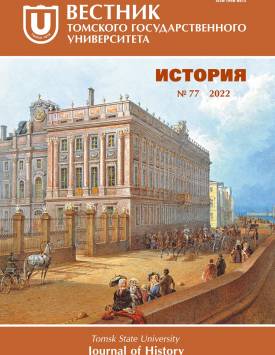Formation of ethnopsychology in the context of “national character”and “national spirit” theories development
The foundation and development of ethnopsychology as a scientific field is of rather high interest not only in domestic but also in foreign science. The reasons for the formation of conditions for its foundation are the most important component of understanding the processes of formation of a given science. The article answers the questions about the development of prerequisites for the foundation of ethnic psychology. The first attempts to explain the differences of ethnic groups and peoples among them were made in ancient Greece by such representatives of ancient science as Herodotus, Hippocrates, Tacitus and others. However, the first studies in this field were made only in the middle of the 18th century by two outstanding philosophers of that time, David Hume and Montesquieu. Their efforts formed two traditions of describing differences between peoples: “national character” and “national spirit”. In European science of that time these traditions began to exert a significant influence on philosophers, historians, and politicians. These traditions began to play an important role in German society due to the efforts of authors such as J. Zimmermann and F. von Moser-Filseck, who exposed the problem of fragmentation of the German national spirit and raised the question of creating a united German state. These traditions were also discussed by such German philosophers as I. Kant and J. Herder, who supplemented them and developed some aspects. Thus, over half a century of the existence of two traditions, important processes were launched in German society, but theories were supported and developed. At the beginning of the 19th century, the theories of Hume and Montesquieu continued to be developed by the German philosophers I. Fichte and G. Hegel and received a deeper study and understanding. Thanks to the work of Hegel, by that time it became obvious to researchers that the “national character” and “national spirit” are, in essence, synonyms and describe the same processes. Under the influence of popularity of the two theories, a basis appears for the ethnopsycho-logical trend in science, which was formed by the scientists M. Lazarus and H. Steinthal. They formed the main tasks of science and its scope. However, in the emerging ethnopsychology, the Montesquieu tradition of “national spirit” and “soul of the people” was used to describe national differences. Later in 1886, the German psychologist, one of the founders of modern psychology, W. Wundt proposed constructive criticism of the new science and thereby completed the process of its formation. The relevance of the national spirit issue in German society led to the formation of ethno-psychological science coincided with the formation and emergence of a unified German state. The author declares no conflicts of interests.
Keywords
ethnic psychology, science, national character, national spiritAuthors
| Name | Organization | |
| Mazhinsky Stanislav V. | Siberian Federal University | mazhinsky@yandex.ru |
References

Formation of ethnopsychology in the context of “national character”and “national spirit” theories development | Tomsk State University Journal of History. 2022. № 77. DOI: 10.17223/19988613/77/18
